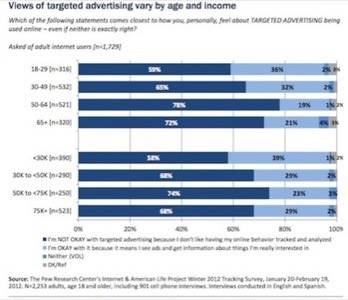A new report out today from the fabulous folks at Pew reveals something that you, Internet user, probably already know.

Most Americans are “anxious” about the personal information that search engines and websites collect from them, according to the study. The majority of ‘Net users disapprove: 65% say that search engines collecting information is a bad thing because it narrows the type of information you’ll get online, effectively creating a Filter Bubble type effect. Conversely, only 29% think search engines collecting information to shape future search results is a good thing because it tailors searches to you. In the age of oversharing on the Internet, Google’s newest privacy policies and Facebook Timeline of your life, is it right to collect and use personal data?
“Search engines are increasingly important to people in their navigation of information spaces, but users are generally uncomfortable with the idea of their search histories being used to target information to them,” said Kristen Purcell, Pew Internet associate director for research and author of the report. “A clear majority of searchers say that they feel that search engines keeping track of search history is an invasion of privacy, and they also worry about their search results being limited to what is deemed relevant to them.”
Google’s new privacy policy is essentially a single privacy policy, working toward one unified product. It went into effect on March 1, and became mandatory for all Google users. It wants to make search, email, YouTube, social and work one experience. This of course means that now Google can more easily personalize content across services.
Facebook’s advertising growth strategy basically comes down to more ads on the site. eMarketer estimates that 85% of its 2011 revenue came from display advertisements. More ads, especially social ads, means more data collection. So be aware of what you’re posting – you’ll continue seeing targeted advertising.
What else did Pew discover? Apparently, 73% of users said that keeping information in order to personalize future search is an invasion of privacy. Only 23% didn’t mind search engines hanging onto their data. The majority of users did not like targeted advertising, either: 68% don’t like their online behavior tracked and analyzed. Approximately the same amount of people who didn’t mind personalized search also don’t care if they’re served targeted advertising. A total 28% said that targeted advertising was actually great because then they’d start to see information about things they were actually interested in. Younger people (ages 18-29) and people who made less than $30,000 per year were more okay with targeted advertising than their older, more money-makin’ counterparts.

On the whole, search engine users were quite pleased with search tools. Ninety-one percent said that they always or most of the time found the information they were seeking.
Image via Shutterstock.
















